Welcome back to This Week in Apps, the weekly TechCrunch series that recaps the latest in mobile OS news, mobile applications and the overall app economy.
The app industry continues to grow, with a record 218 billion downloads and $143 billion in global consumer spend in 2020. Consumers last year also spent 3.5 trillion minutes using apps on Android devices alone. And in the U.S., app usage surged ahead of the time spent watching live TV. Currently, the average American watches 3.7 hours of live TV per day, but now spends four hours per day on their mobile devices.
Apps aren’t just a way to pass idle hours — they’re also a big business. In 2019, mobile-first companies had a combined $544 billion valuation, 6.5x higher than those without a mobile focus. In 2020, investors poured $73 billion in capital into mobile companies — a figure that’s up 27% year-over-year.
This Week in Apps offers a way to keep up with this fast-moving industry in one place with the latest from the world of apps, including news, updates, startup fundings, mergers and acquisitions, and suggestions about new apps and games to try, too.
Do you want This Week in Apps in your inbox every Saturday? Sign up here: techcrunch.com/newsletters
Top Stories
TikTok is ready for advertisers, e-commerce, it says
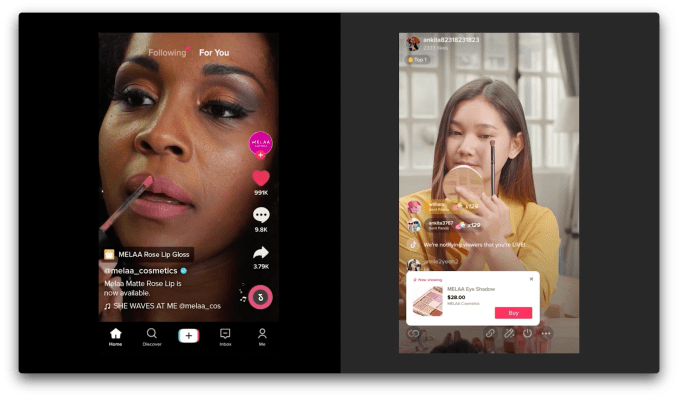
Image Credits: TikTok Shopping
At TikTok’s online event, TikTok World, the company announced a range of new initiatives, product updates and advertising formats in an effort to woo more marketers to its platform. On the e-commerce front, TikTok expanded its set of shopping partners beyond pilot partner Shopify. Earlier this year, the video platform began piloting TikTok Shopping in the U.S., U.K. and Canada, in a deal that allowed Shopify merchants with a TikTok For Business account to add a Shopping tab to their TikTok profiles and sync their product catalogs to the app to create mini-storefronts. Now, TikTok is rolling out to new brand partners for TikTok Shopping, including Square, Ecwid and PrestaShop, with Wix, SHOPLINE, OpenCart and BASE coming soon. It also introduced a fuller slate of solutions for TikTok commerce, including ad products and later this year, a TikTok Shopping API. The app now offers a trio of in-feed ad products for online shopping: Collection Ads which feature swipeable and tappable product cards; Dynamic Showcase Ads (DSAs), which are automatically generated ads; and Lead Generation ads.
The company also presented its new plan to ramp up advertiser investment with a new promise of “brand safety” and the launch of several new and interactive ad formats, ranging from clickable stickers to “Choose Your Own Adventure”-type ads to “super likes” and more. The ads are meant to encourage TikTok users to tap, swipe and use gestures to interact with the ads’ content. There’s even an ad where users get to direct the storytelling, and a mini page that lets brands connect users with their message directly in the TikTok app.
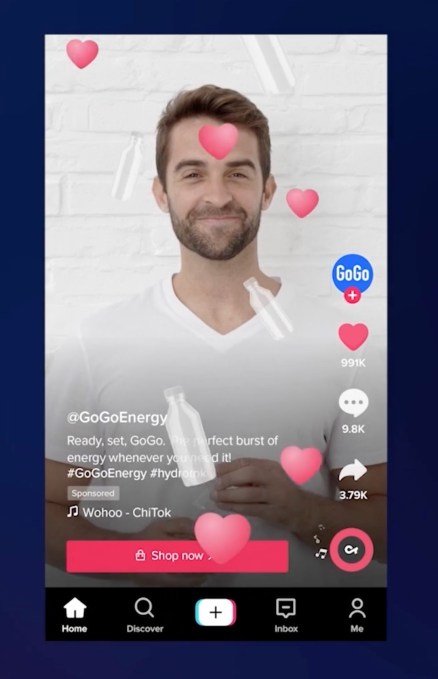
Image Credits: TikTok (super like)
To date, marketers haven’t carved out as much of their spending for TikTok compared with other major platforms, like Facebook and Instagram. But TikTok parent company ByteDance has been making inroads in the global ad market, with annual revenue across its apps more than doubling in 2020 to reach $34.3 billion. In the U.S., TikTok was expected to bring in $500 million in 2020, up from $200-$300 million in the year prior, according to a report by The Information. (Some of that is from in-app purchases, of course.)
As TikTok has scaled its ad business, its ad prices have been steadily increasing, too. Bloomberg noted this summer it was jacking up home page takeover ads, its most valuable real estate, to more than $2 million on top days — like holidays. Reuters also noted that TikTok saw a 500% increase in the number of advertisers that were running campaigns in the U.S. from the start of 2020 to the end, though ad sales were still small compared with other major platforms. That continues to be the case in 2021. In fact, TikTok was not even broken out in eMarketer’s recent tabulation of U.S. ad revenues, where it’s instead lumped into an “Other” category with other, smaller social networks (like Tumblr), which, combined, are expected to reach $1.3 billion in 2021.
The company also this week announced a new milestone with 1 billion monthly active users worldwide.
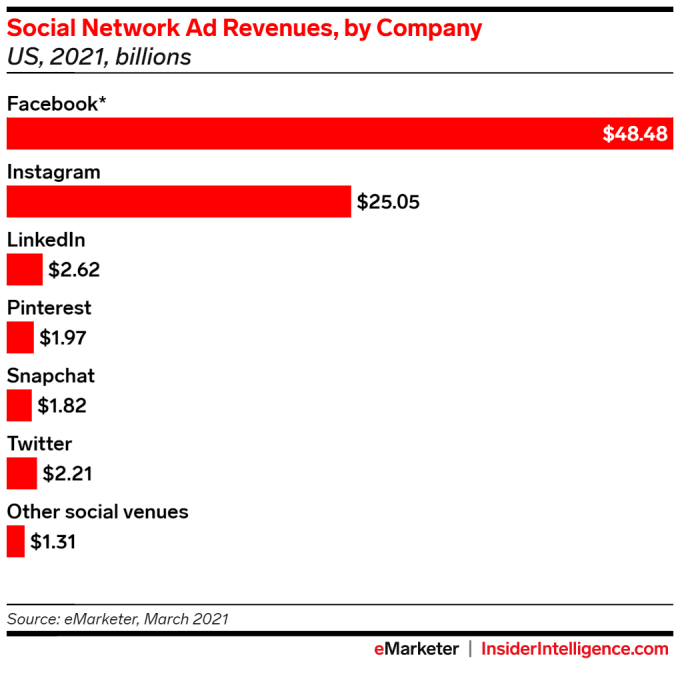
Image Credits: eMarketer
Apple finally lets users review its own apps
Apple has put itself on equal footing with its rivals by allowing users to rate and review its first-party apps that are available for download in its App Store. That means users can now leave reviews for built-in apps like Mail, Music, News, Stocks and Calculator and others. Some apps are holding up better than others. News is sitting at 2.5 stars as users complain about ads, even in the paid version, personalization elements, nags to buy Apple News+ and more. Podcasts has just 2 stars, Apple Music has 3.5 stars. Fitness is doing well with 5 stars, and Wallet app has a solid 4.
The change likely came about due to increased regulatory scrutiny over the App Store, which critics argue gives Apple an unfair advantage over its competition. That could have included not displaying user sentiment and feedback about Apple’s own apps.
Microsoft Windows store opens to third-party storefront; your move, Apple?
Remember when Apple last year argued that its commission rate wasn’t so high because the wider market for apps and games had already determined that 70/30 was a standard split? At the time, it pointed to other major app stores’ policies, including the Amazon Appstore, Galaxy Store and Microsoft Store as points of comparison with its own App Store. (See below)
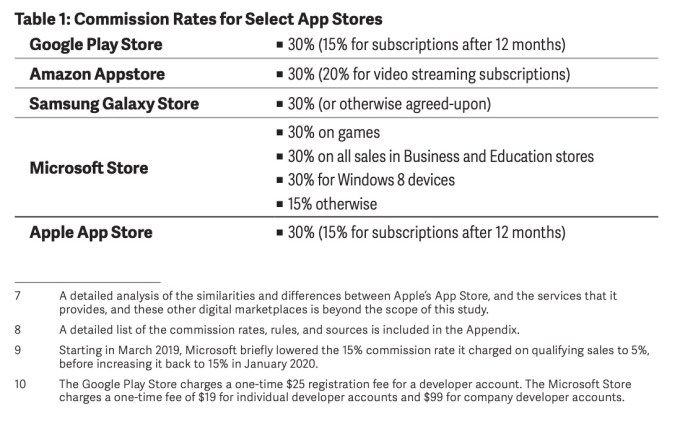
Image Credits: Analysis Group
Well, Apple would probably appreciate it if everyone would look away from those app stores now. And particularly don’t look too closely at what the updated Microsoft Store is doing!
This June, the Microsoft Store updated its revenue share terms and policies to offer more favorable terms. App developers using Microsoft’s payments platform will now see an 85/15 revenue share, while game developers will see an 88/12 split as of August 1. More importantly, (non-game) app developers are allowed to use third-party payment processors in their own apps and retain 100% of the revenue.
This week, the Microsoft Store announced it will allow third-party app store apps as well. The company says it will make third-party storefront apps discoverable in the Microsoft Store on Windows, including Amazon and Epic Games, over the next few months. There is no requirement for these stores to also list their apps and games inside the Microsoft Store, if they choose to go this route. And they can use their own payment processors and keep the revenues.
While being presented as a major win for an open ecosystem, the reality from a consumer’s perspective is that this doesn’t change much. You could always download third-party apps and third-party app stores, like the Epic Games Store, on Windows devices.
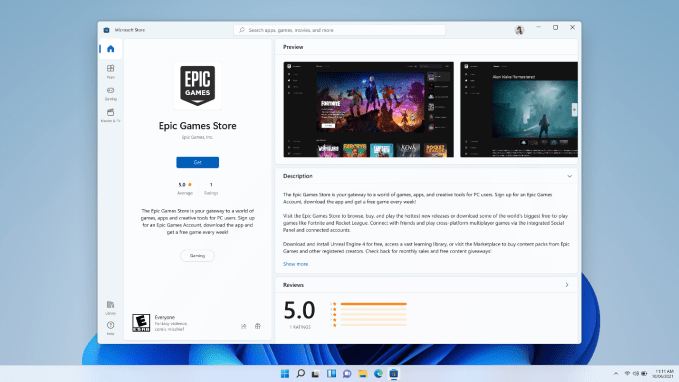
Image Credits: Microsoft
But in the broader regulatory environment, it’s a deft move. It immediately reduces the potential regularity scrutiny that could have landed on Microsoft — after all, the company is still tapping into the revenue streams for the apps and games it hosts, in some cases. And it would like that to continue! However, now Microsoft will be able to say developers on its platform have choices — they can distribute their apps with their own payment mechanisms and they can package their games into storefronts to avoid commissions, too.
This, in turn, will point the finger back at Apple and Google as being the platforms that are being slow to catch up with where the market is headed. And it could potentially keep Microsoft’s name out of any forthcoming legal battles or new app store legislation. In the meantime, Microsoft’s expanded and redesigned store — which will include storefront apps, PWAs and alternative browsers, too — has a better shot at becoming a place where users actually want to shop.
The question of third-party storefronts has been a longtime point of contention between Epic Games and Apple — the gaming company wants to offer its own distribution system from within the App Store to reach iOS users and retain the revenue it generates. But this issue extends further back than Apple’s latest fight with Epic. Apple has banned third-party app store apps for years, as they had been used in the past as a way to artificially inflate app store rankings. The storefront apps claimed that all they offered was another way to discover new apps, of course. But even that was a threat. Apple has always wanted to own discovery — and the ad dollars that accompany paid discovery, too.
While anyone who understands app ecosystems knows that a PC platform like Windows is not at all a direct comparison to a closed ecosystem like iOS and the App Store, it was Apple itself that had listed Microsoft, among others, as points of comparison. Apple said “everyone else was doing x,” so it should too, when it came to commissions. Now the company will have to hope that regulators can pick up on the nuances between a Windows app store and its own.
Weekly News
Apple Updates
- Some users are reporting CarPlay issues with iOS 15 and iPhone 13, which is leading CarPlay to suddenly crash whenever someone tries to play music through Apple Music or third-party apps, like Spotify. This is a pretty serious complaint, with users filling online forums with their issues. Such a bug would be acceptable in a beta release, but in a public build it’s definitely not.
- The latest iOS 15.1 beta fixes the “Unlock with Apple Watch” bug which was preventing users from unlocking their iPhone 13 with their Apple Watch.
- Apple reminded developers to get ready for the iPad mini’s new display. The company said if developers were following best practices with Auto Layout and size classes, their app’s interface will dynamically adapt to the new dimensions. If, however, they added UIRequiresFullScreen=YES to the app’s Info.plist in order to keep your app full screen during multitasking, they’ll instead need to recompile with Xcode 13 and the SDK for iPadOS 15 to take advantage of the full screen size.
Android Updates
- Google announced the return of the #AndroidDevSummit, which is now taking place October 27-28. The event will detail the latest updates in Android development directly from the Android team, and will give developers the ability to connect with other developers around the world.
- Google published a post to answer developers’ top questions it has received about the new Android Game Development Kit.
E-commerce & Food Delivery
- Food delivery app Deliveroo entered the grocery delivery market with a new service, Hop, that will now deliver fresh food and other grocery items to customers in just 10 minutes. The service is the result of a partnership with the British supermarket chain Morrisons.
Augmented Reality
- Snap and WPP partner on augmented reality, with The AR Lab. The partnership aims to help brands use AR to build immersive consumer experiences, including e-commerce experiences.
Fintech
- Robinhood partners with Snap to bring its short-form “Snacks” videos to Snapchat’s Discover section twice per week. Snacks aim to offer easily digestible and engaging financial news and education. Snacks will also roll out to a subset of Robinhood customers in its own app soon.
- Google is killing its plans for its mobile banking service Plex, The WSJ reported. The service worked in partnership with traditional banks like Citigroup and smaller credit unions, and worked with Google Pay.
Social
- Instagram announced it’s “pausing” a planned version of the social media software aimed at children younger than 13. The news of the pause followed critical reporting by The Wall Street Journal, which revealed Facebook’s internal research where the company was looking into data indicating the social media app caused anxiety and mental health issues in teenaged girls.
- Facebook was grilled in Congress over how its apps impact teens’ mental health. The hearing came in the wake of The WSJ’s release of the “Facebook Files,” leaked internal research that indicated the company has been aware of the negative impacts of its form of social media on teens. Senator Blumenthal said his staff tested the issue by creating an account pretending to be a 13-year-old girl and was pointed to accounts featuring extreme dieting, eating disorders and self-harm. But the highlight of the hearing may have been when he asked Instagram to end the “finsta,” clearly having no idea what that meant.
- TikTok settled its lawsuit with the voice actress who was the app’s original text-to-speech voice. The actress said TikTok used her voice without permission. TikTok has since switched to a new voice.
- TikTok announced its first NFT drop. The company is leveraging content from some top creators, including Lil Nas X, Grimes, Bella Poarch, Rudy Willingham and Gary Vaynerchuk who will release one-of-one and limited edition NFTs. The drop appears to be more of an experiment with the NFT market, rather than a start of a larger initiative for the time being.
Messaging
- Messenger rolls out cross-app group chats, allowing Facebook Messenger users and Instagram users to join chats together. Other new additions include polls in Instagram DMs and a group typing feature for group DMs (which shows you which friends are typing, regardless of the app they’re using). Instagram users will also be able to use Messenger’s Watch Together feature to view Instagram posts like Reels and IGTV videos at the same time.
- Google’s Gboard is ditching its “Minis.” The selfie-based stickers were Google’s attempt to offer its own Bitmoji or Memoji type of feature, but the feature must have demonstrated low usage as it’s now being killed.
Streaming & Entertainment
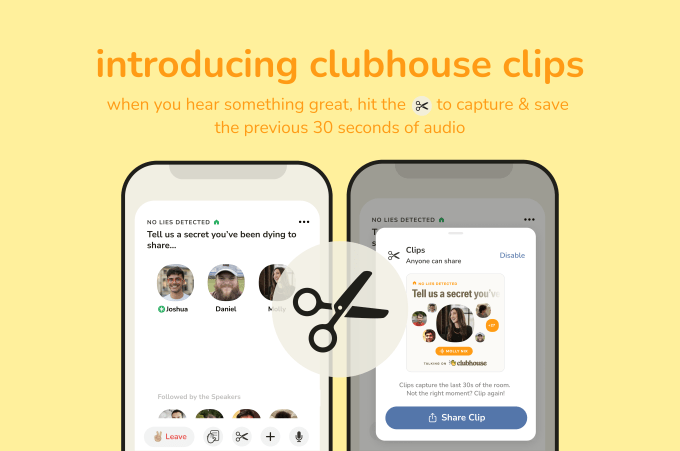
Image Credits: Clubhouse
- Clubhouse adds clips and replays for asynchronous listening, better search and spatial audio for Android. The biggest news here is that Clubhouse can now be used to record shows for use as podcasts, something Twitter said it was also bringing to Spaces.
- Spotify rolls out listener polls and Q&As to all creators through its podcast creation app, Anchor. When the podcast is published on Spotify, the polls and Q&As will appear at the bottom of the podcast’s episode page on the Spotify mobile app, both iOS and Android. Listeners can then follow the prompt to respond to the poll or Q&A in the app.
- A fix for a bug with Spotify that appears to be draining the iPhone battery on iOS 15 is being fixed, the company said. In the meantime, Spotify suggested disabling Background App Refresh, under Settings -> General -> Background App Refresh.
- Disney+ has topped $1.5 billion in worldwide consumer spending on its mobile app, reports Sensor Tower.
Gaming
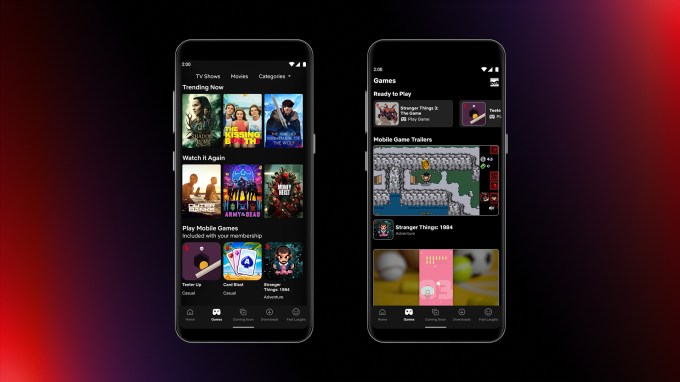
Image Credits: Netflix
- Netflix launched three new casual mobile games in Poland, Italy and Spain as a members-only perk. “Card Blast” is licensed from U.S.-based Rogue Games, while “Shooting Hoops” and “Teeter Up” come from Canadian developer Frosty Pop. They joined the other “Stranger Things” games Netflix licensed from BonusXP. The new titles will be made available through a new “Games” tab inside the Netflix app, which directs members to the games’ listings on the Google Play Store. Here, they’ll download and install the game, then use their Netflix credentials to begin playing. The company also acquired gaming studio Night School Studio, makers of Oxenfree.
- BlueStacks launched a cloud gaming service called BlueStack X that offers free streaming of Android mobile games across the web, iOS, Android, Mac, PC and Linux. The service uses its now.gg hybrid cloud technology, combined with Amazon’s AWS Graviton, and offloads some of the compute and graphics rendering to local devices.
- Epic Games is making its parent verification system available for free. The system, which helps parents give their consent so kids under the age of 13 can play games, was acquired as part of Epic’s purchase of kid tech startup SuperAwesome. The tech is used in a number of popular games like Fortnite and Pokémon GO.
- Tencent’s “Honor of Kings” has topped $10 billion in player spending since its launch in 2015, setting a new record for mobile games, according to Sensor Tower data. The game made more than $2 billion in 2021 alone.
Health & Fitness
- The proof-of-vaccination app Portpass has exposed personal information, including the driver licenses, of hundreds of thousands of users. CBC News received a tip that user profiles on the app’s website were publicly accessible, but verified that email addresses, names, blood types, phone numbers, birthdays, as well as photos of identification like driver licenses and passports can easily be viewed.
Travel & Transportation
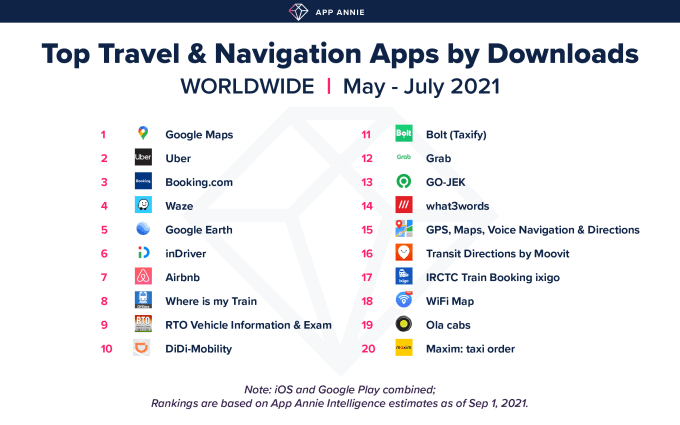
Image Credits: App Annie
- Uber, Booking.com, Google Maps and Waze dominate summer travel apps by worldwide downloads. Google Maps was the most downloaded travel and navigation app (based on the three months ending July 31, 2021). Uber was the second-most downloaded app and No. 1 in monthly active users worldwide.
Utilities
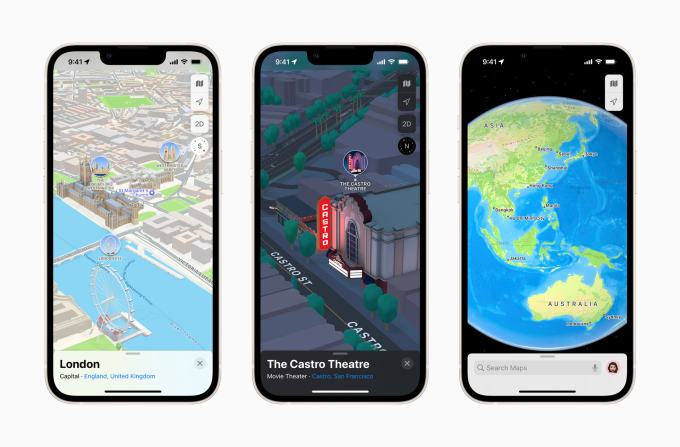
Image Credits: Apple
- Apple Maps rolled out its 3D maps to more cities, including London, LA, New York and San Francisco. The experience, launching with iOS 15, follows several years of investment in Apple’s mapping platform to make the app more competitive. With 3D maps, Apple Maps users will be able to see more details for areas across the city, including their neighborhoods, commercial districts, marinas, buildings and more, along with elevation details, new road labels and even custom-designed landmarks — like Coit Tower in San Francisco, Dodger Stadium in LA, the Statue of Liberty in NYC and Royal Albert Hall in London.
- Google Maps is adding a wildfire layer to its apps that, when turned on, will display nearby fires marked on the map. Tapping one will bring up its live outline as of an hour or so ago. The app is also expanding a tool for calculating tree canopy cover in cities and further automating virtual address creation with Plus Codes.
Productivity
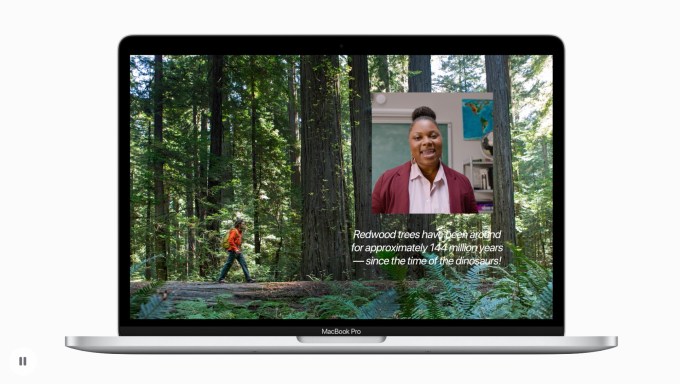
Image Credits: Apple
- Apple gave its iWork suite a notable update. One of the standout features is the addition of a live video feature in Keynote, which lets you place a live camera view or screen capture view as video objects on a slide. These live video objects can be resized or styled with masks, frames, drop shadows and reflections. Users can also connect multiple external cameras for more interactive demos using different camera angles. Other new features include an optimized mobile experience for Pages; support for Pivot Tables and Radar charts (a new chart type that makes it easy to visually compare multiple variables) in Numbers; and support for new translation features across the suite of apps.
- Yahoo is developing a new calendar app called Day, with help from Jeremy Le Van — who co-founded the popular calendaring app, Sunrise, which sold to Microsoft for over $100 million.
Government & Policy
- South Korea tells Apple and Google to turn in their compliance plans with the country’s new app stores law by mid-October. The law now bans app store operators from forcing developers to use their own payment systems — something that’s at the heart of the Epic-Apple lawsuit in the U.S.
- Google blasted EU antitrust regulators for ignoring Apple when it launched a bid to get the European Commission to annul the €4.34-billion ($5.1 billion) fine related to the anti-competitive nature of its Android OS.
- A new payments rule in India will impact tech companies, including Apple, Google and others. The Reserve Bank of India’s new directive requires banks, financial institutions and payment gateways to obtain additional approval for auto-renewables transactions worth over 5,000 Indian rupees ($67) from users by conducting notifications, e-mandates and Additional Factors of Authentication (AFA). Tech companies have been warning customers and partners in India to expect a surge in declined transactions.
Security & Privacy
- A new Android malware called GriftHorse is believed to have infected more than 10 million Android devices across 70+ countries. The malware subscribes users to premium SMS services, generating between $1.5 million to $4 million per month.
- Mozilla previewed new features to Firefox on Android that will help protect users’ passwords from hackers and breaches. The features will allow users to create, use, autofill and safely unlock passwords with a fingerprint or face. The features will be rolled out with the Firefox 93 update on Tuesday, October 5th.
Funding and M&A
 Netflix acquired its first gaming studio with the purchase of Night School Studio, the independent game developer known for narrative-driven titles like Oxenfree, which produces games for both mobile and consoles. The acquisition came less than a day after Netflix launched three new casual mobile games in Poland, Italy and Spain, and a month after it released two games that were tie-ins to the “Stranger Things” series.
Netflix acquired its first gaming studio with the purchase of Night School Studio, the independent game developer known for narrative-driven titles like Oxenfree, which produces games for both mobile and consoles. The acquisition came less than a day after Netflix launched three new casual mobile games in Poland, Italy and Spain, and a month after it released two games that were tie-ins to the “Stranger Things” series.
 French mobile gaming company Voodoo acquired Beach Bum, a game studio based in Israel that specializes in tabletop and card games. Deal terms were not disclosed but sources say the price could be a few hundred million. Beach Bum has generated $70 million in revenue over the past 12 months.
French mobile gaming company Voodoo acquired Beach Bum, a game studio based in Israel that specializes in tabletop and card games. Deal terms were not disclosed but sources say the price could be a few hundred million. Beach Bum has generated $70 million in revenue over the past 12 months.
 PSPDFKIT, which offers software that allows developers to enable document collaboration, signing, markup and more, in their own apps for web and mobile, raised €100 million ($116 million) from Insight Partners to continue to grow its business. The company’s tech is now approaching 1 billion users in 150 countries.
PSPDFKIT, which offers software that allows developers to enable document collaboration, signing, markup and more, in their own apps for web and mobile, raised €100 million ($116 million) from Insight Partners to continue to grow its business. The company’s tech is now approaching 1 billion users in 150 countries.
 Stockholm-based insurance tech startup Hedvig, which offers property, travel and accident insurance for younger adults, raised $45 million in Series B funding led by Anthemis. The company has around 70,000 customers for its app, available on iOS and Android.
Stockholm-based insurance tech startup Hedvig, which offers property, travel and accident insurance for younger adults, raised $45 million in Series B funding led by Anthemis. The company has around 70,000 customers for its app, available on iOS and Android.
 Fintech app Betterment raised an additional $160 million, including a $100 million credit facility and a $60 million Series F equity round led by venture capital firm Treasury. The company, which now has around 700,000 clients and $32 billion under management, is valued at nearly $1.3 billion.
Fintech app Betterment raised an additional $160 million, including a $100 million credit facility and a $60 million Series F equity round led by venture capital firm Treasury. The company, which now has around 700,000 clients and $32 billion under management, is valued at nearly $1.3 billion.
Downloads
Pearl: Wellness Reminders
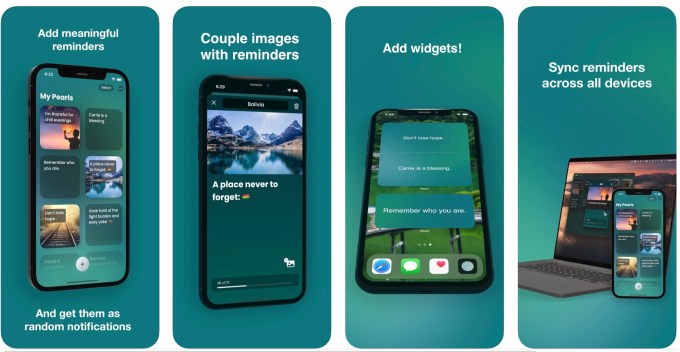
Image Credits: Cephalopod Studio LLC
I love that the App Store still supports (at least, for now) small, single-purpose indie apps like Pearl. The app is great if you’re the kind of person who gets energized by motivational quotes or just needs to be reminded to chill, be calm, breathe, work toward your goals or anything else. With Pearl, you can turn Apple’s push notification system from a thing of annoyance into a thing that brings hope and purpose. The app lets you add images to motivational quotes or any other message of your choosing to create custom push notifications that will appear randomly throughout your day. Mac, iPhone and iPad are supported. Free download with a $1.99 one-time in-app purchase for multiple notifications.
Quiver Quantitative
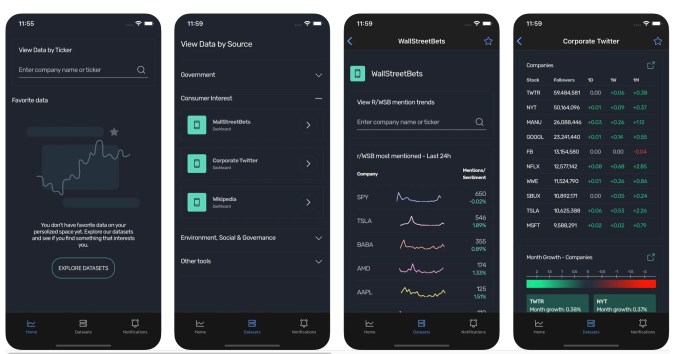
Image Credits: Quiver Quantitative
Have you ever wondered which politicians own a stock you’re looking into? Or do you wish you could see what the WSB folks were into without having to constantly check in with that community? Maybe you like to read Reddit for crypto ideas? In other words, if “alternative data” is your thing, Quiver Quantitivative is a destination that makes it easier to access, by pulling from public records and message boards and putting it all in one place. While we can’t recommend making investment decisions off alternative data, as a research tool, the Quiver Quantitative app is an interesting find. The app was updated this week with a new dashboard tracking stock trading by U.S. Representatives, a new dashboard tracking off-exchange trading and a new dashboard tracking Reddit cryptocurrency discussions.
source https://techcrunch.com/2021/10/02/this-week-in-apps-tiktok-shops-for-advertisers-microsoft-makes-app-store-changes-apples-apps-get-reviews/



0 Comments